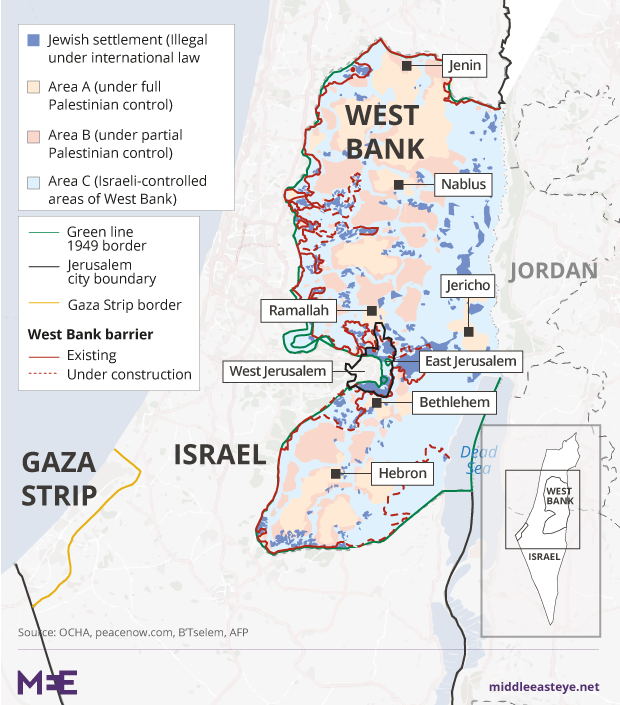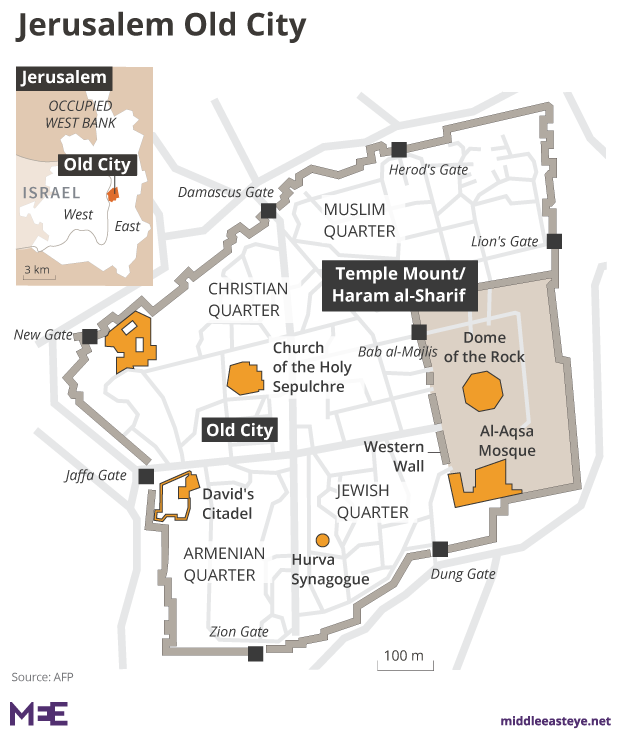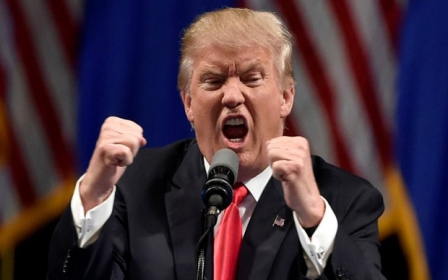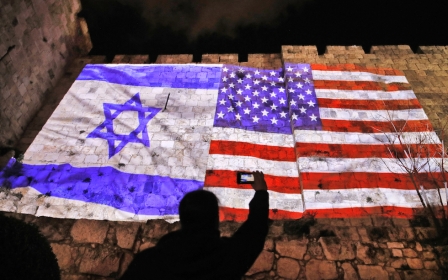Thank you President Trump, you have finally ended US double-speak on Middle East 'peace'

US President Donald Trump's recognition of Jerusalem as the capital of Israel consolidates five decades of US foreign policy that has steadily facilitated Israel's settler-colonial encroachment into East Jerusalem and the West Bank generally.
While the Lyndon B Johnson administration was among the global consensus opposing Israel's annexation of East Jerusalem in 1967, successive US administrations have spoken out of both sides of their mouth.
On the one hand, they have insisted that settlement expansion in Occupied Territory is a violation of international humanitarian law and counterproductive for establishing permanent peace. On the other hand, it has provided Israel with unconditional military, financial, and diplomatic aid allowing Israel to complete its settler-colonial expansion without suffering any serious legal or political consequences.
Under the veneer of peacemaking
Between 1967 and 2017, the United States has used its veto power 43 times to block Security Council resolutions aimed at adjusting Israel's behaviour and reigning in its settlement enterprise.
Thanks to the United States, Israel has been able to increase its settler population in the West Bank from 200,000 in 1993 to 600,000 today all under the veneer of peacemaking. Far from signalling a doomsday scenario, Trump has removed the emperor's clothes to reveal the farce of the US-mediated peace process.
In 1967, when Israel captured the West Bank, including East Jerusalem, and the Gaza Strip, the international community had categorically rebuffed territorial acquisition by war - also known as conquest. In order to facilitate a just and lasting peace in the region, the Security Council passed Resolution 242 establishing that Israel will return all lands occupied in the course of the 1967 war in exchange for permanent peace.
Whereas this should have obligated Israel to maintain the status quo in the territories until the resumption of peace, Israel has insisted that Jewish sovereignty extends over the West Bank and East Jerusalem, especially, and that its capture of the territory is tantamount to the liberation of Jerusalem from the Arabs.
It never had any intention to withdraw.
Thanks to the US, Israel has been able to increase its settler population in the West Bank from 200,000 in 1993 to 600,000 today all under the veneer of peacemaking
In fact, it unilaterally annexed East Jerusalem in late June 1967. The General Assembly unanimously passed two resolutions (UNSC Res 2253 and 2254) condemning the annexation and demanded that Israel rescind all actions taken to alter the status of Jerusalem.
The Uinted Kingdom voted for both resolutions and the United States abstained indicating opposition to territorial expansion. Both the United States and United Kingdom refused to move their embassies from Tel Aviv to Jerusalem in protest.
To deflect criticism, Israel's ambassador to the United Nations claimed that Israel's actions did not amount to annexation, but were merely administrative. As to the biting warnings and criticism, Israel simply ignored them and has suffered little consequence in the intervening decades.
US's aggressive intervention
Israel's success in evading meaningful legal and political consequence is attributed to the US's aggressive intervention. Since 1967, the United States has been committed to a dual policy of ensuring Israel's qualitative military edge in the region, enabling it to overcome any individual or collective military threat, as well as ensuring an unencumbered political agreement.
This dual commitment has driven it to shield Israel from meaningful international censure because the imposition of external legal obligations would diminish Israel's negotiating leverage in a land-for-peace framework.
Additionally, the United States' commitment to Israel's military superiority in the region has impeded the application of any significant pressure on its ally.
Under the peace process framework, the horizon of Palestinian freedom is a set of discontiguous bantustans
With the diplomatic cover of global superpower, Israel has steadily grabbed Palestinian lands for Jewish-Israeli civilian settlement and concentrated and removed Palestinians into increasingly shrinking areas of land.
Rather than reverse these conditions, the 1993 Oslo Peace Accords formalised them.
The Oslo Accords established a five-year interim arrangement to usher final status talks within five years. The interim arrangements are not based on any international law but instead purport to fulfill the obligations stipulated by UN Security Council Resolution 242 and 338, as well as other relevant law, in the form of political agreement.
Meaning that rather than allow international law regarding Jerusalem and occupation to guide the negotiations, the outcome of the negotiations would be considered as sufficient and tantamount to compliance with the law.
The outcome has been disastrous.
From interim to permanent
The interim arrangements have become a permanent structure and led to the present-day status quo: a wall that effectively confiscates 13 percent of the West Bank, an aggressive ethnic cleansing policy in Jerusalem that explicitly aims to reduce the Palestinian population in order to maintain a significant Jewish demographic majority, Israel's civil and military jurisdiction in Area C, or 62 percent of the West Bank, and the violent bifurcation between the West Bank and the Gaza Strip.
If facts on the ground were not compelling, Israeli Prime Minister Benjamin Netanyahu has made clear that there will never be a Palestinian state. Under the peace process framework, the horizon of Palestinian freedom is a set of discontiguous bantustans where Palestinians can exercise self-autonomy but never achieve meaningful sovereignty.
The official Palestinian leadership should have abandoned this programme in 2001, when at the start of the Al Aqsa Intifada, Israel expanded its use of military force to crush Palestinian protest and inaugurated a new chapter of domination again under a security pretext.
Instead, Palestinian officialdom has clung onto the undue faith that the United States would deliver independence so long as Palestinians remained compliant. In exchange for its compliance, the United States has endorsed Israel's conquest of Jerusalem and consolidated its settler-colonial expansion programme.
Trump has finally ended the United States' double-speak and should have ended any faith that the United States will deliver Palestinian independence or that Israel is interested in giving up its territorial holdings captured in war.
Attributing responsibility for the next chapter in the Middle East, characterised by the formal abandonment of a Palestinian state and apology for Israeli apartheid, to Trump would be a revisionist attempt to blame one abnormal and unhinged administration for a policy that has been upheld by "normal" Republican and Democratic administrations for over five decades.
Short and long-term consequences
The question is what will be the short and long-term consequence of Trump's disavowal of US diplomatic double-speak? It may mean that Congress can make good on its repeated threats to shut down the PLO office in the United States, and to cease aid to the Palestinian Authority.
On the ground in Palestine, it will likely lead to an increase in settlement activity as this is par for the course. Israel announced more settlements in the wake of the admonishing Security Council Resolution 2334; it will surely continue with settlement expansion now with less irony.
Whether the Knesset would make good on its vows to annex Area C, 62 percent of the West Bank, to formalise its de jure apartheid regime, however, is not clear as even a supportive US administration cannot shield Israel from negative recriminations from other states, including members of the European Union.
The most likely scenario is a creeping annexation policy as opposed to a wholesale seizure of the territory.
Under PA President Mahmoud Abbas, in particular, the Palestinian leadership has abandoned confrontation with Israel as a matter of policy
Whether Arab states will be mobilised into action depends on a series of unknown factors regarding their own national interest. The ideal response is to suspend ties with Israel and the United States, but for several states, including Saudi Arabia, Egypt and Jordan, the primary concern is maintaining US patronage.
Despite protest from other US allies in the region, it is not impossible that Israel will promise religious rights in Jerusalem in order to appease them.
If so, Palestinian national rights will be formally abandoned and they will come under the full discretionary whim of Israel as non-citizens of the state and non-sovereigns.
Many predict an uptick in attacks by Palestinians - and perhaps that is true - but if so, it will most likely be a series of uncoordinated attacks launched by individuals who have nothing to lose.
Delegitimising Israel's apartheid regime
But a mass civil uprising across the Palestinian population is unlikely for two reasons.
One, since Israel dramatically increased its use of force against Palestinians in 2000, Israel has used lethal force as a measure of first resort. While this will also provoke a more militarised response from Palestinians, that response excludes the majority of Palestinian communities, men and women alike, who do not bear arms.
The best course for Palestinians is a mass movement aimed at delegitimising Israel's apartheid regime. The Boycott, Divestment, and Sanctions movement is one critical element of this strategic course.
Two, sustaining a mass uprising is unlikely without a revolutionary change in the Palestinian leadership. Since 1993, the formal leadership has been part of a containment strategy and has worked to ease the burden of occupation and to make it more tolerable rather than to resist it.
Under PA President Mahmoud Abbas, in particular, the Palestinian leadership has abandoned confrontation with Israel as a matter of policy.
Well before Trump's announcement, Israel and the Palestinians have been in a critical and volatile holding position. All the while, and in the seemingly "calmest" times, Palestinians have endured brutal structural violence.
Palestinians should have long changed the rules of the game regulating the question of Palestinian freedom and, while it is unfortunate that Trump beat them to it, the point is that they must finally be moved into more forthright action.
The Palestinian leadership must pivot away from the United States and continue to internationalise the conflict, to delegitimise Israel’s settler-colonial project, to demand states impose economic and military sanctions upon Israel, and support a robust and global grassroots BDS movement.
Nothing will stave off deterioration of conditions on the ground marked by violent confrontations, so the question must not be how to avoid violence, but how do we reach a viable and just solution.
- Noura Erakat is a human rights attorney and activist and an assistant professor at George Mason University. She has taught international human rights law in the Middle East at Georgetown University since Spring 2009. Noura is a co-editor of Jadaliyya.
Middle East Eye propose une couverture et une analyse indépendantes et incomparables du Moyen-Orient, de l’Afrique du Nord et d’autres régions du monde. Pour en savoir plus sur la reprise de ce contenu et les frais qui s’appliquent, veuillez remplir ce formulaire [en anglais]. Pour en savoir plus sur MEE, cliquez ici [en anglais].








